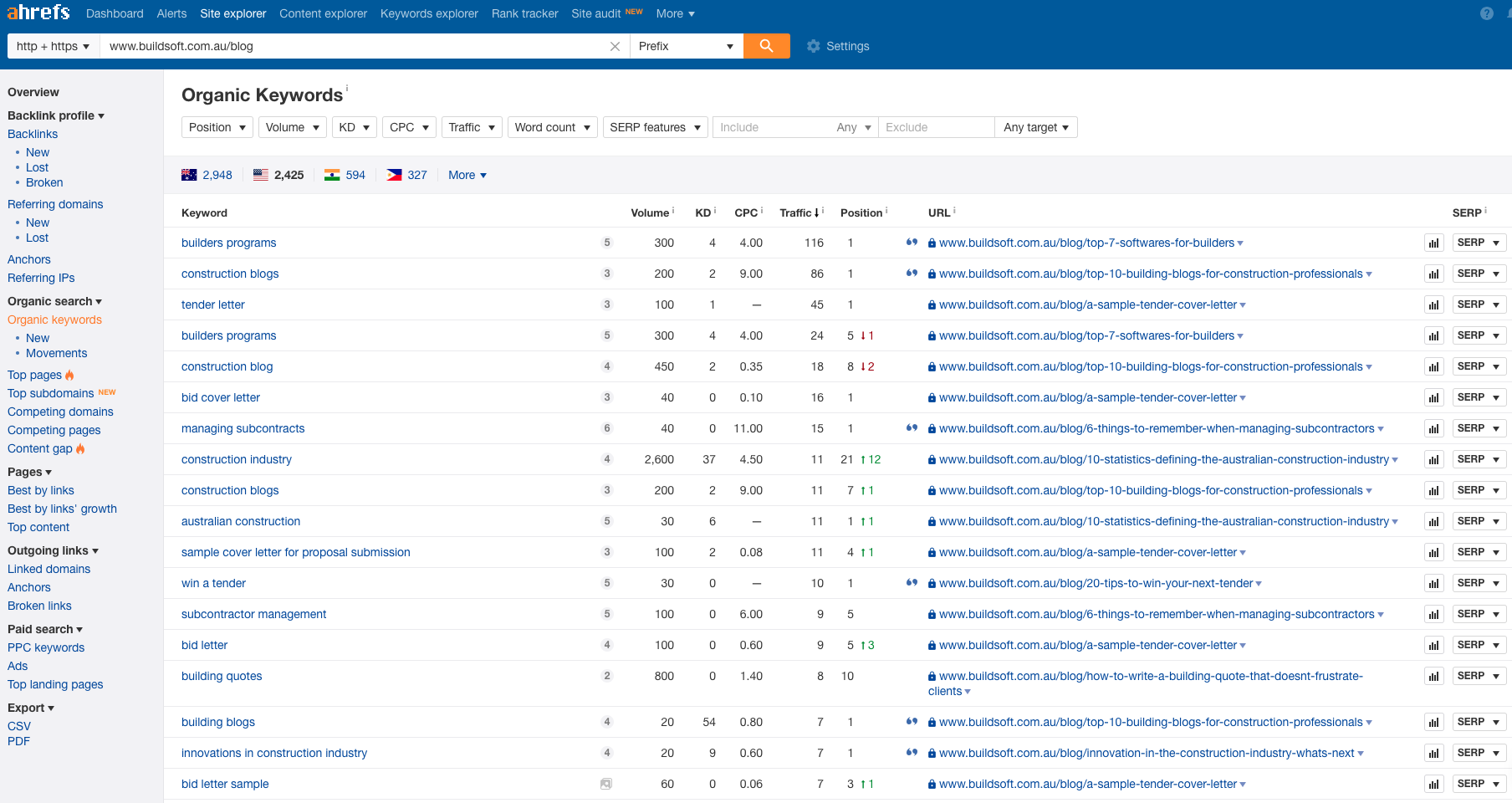How To Use Keyword Research To Write Better Blog Posts
May 20, 2019
CONSUME CREATIVELY
This content is available in:
This content is available in:
TEXT

So you’ve started a blog as part of your marketing strategy, to attract new customers and engage your existing ones. All you have to do is fill it with informational, interesting, engaging content that shows up at the top of every Google search results page…
Pretty easy, right? Maybe not so much.
If you’ve been small business blogging for a bit, you’re familiar with the struggle to gain traction—especially if you own a commercial construction business or a B2B company where it’s not always obvious how to appeal to potential readers. The posts you write may not be getting visitors, or your pages aren’t converting readers to customers, or you’re at a loss for what to write about.
You got into this business to build, not to blog, right?
This is where keyword research comes in handy. Researching keywords combines the creativity of blogging with the hard data of analytics, helping turn your aimless musings into content that targets your audience and encourages them to stay on your site.
What is keyword research?
Keywords, which can be singular words or “long-tail keywords” (phrases of three or more words that get more specific about a topic), are ideas or terms that search engines use to determine what a web page is about. Does the phrase “best camping gear” appear multiple times on one page? Odds are, it’s a page about the best camping gear.
Keyword research, then, is investigating which keyword terms people are typing into search engines (namely Google) and figuring out how to build your content around those words so your content ranks higher in search results.
Why use keyword research when writing blog posts?
If you build your content around the right keywords, you’ll rank higher in Google search, and people will be more likely to click on your content. More traffic translates to more leads, which translates to more customers.
But why not just write a blog post and then add some keywords? Because bad SEO writing is full of articles with keywords and phrases shoehorned in awkwardly, with little regard for context.
Keywords are very important, but they’re not more important than quality content. Google will notice when people come to your page and immediately leave due to your spammy articles, and dock your ranking accordingly. The best articles strike a balance, and that balance is easier to find when you have your keywords (and related keywords) in mind ahead of time.
The worlds of keyword research and SEO, in general, are complex, and many find it worth their while to outsource their blogging efforts to marketing agencies, freelancers, and other third parties. But if you want to explore this method of creating content on your own, here are some excellent ways to get started:

1) See how your existing content ranks.
If you’ve been blogging for awhile, you likely already have some pages ranking in Google’s search results. They might not be ranking high for a variety of reasons — but after conducting some keyword research, your use of keywords should not be one of them.
Use a tool like Ahrefs, SpyFu, SerpStat, or Google Ads/Google Search Console to review the “organic keywords” of your webpage. Which words does your site appear for? Using Ahrefs, SpyFu, SerpStat or Google Ads, you can see not only how many times these keywords appear in searches, but how difficult it will be to rank in the top 10 of Google search results, and what your current position is.
If you have an equipment resale business, but your website hardly pulls any traffic for the long-tail keyword “best construction equipment,” you may want to beef up any articles you currently do have on the subject—or write entirely new content based around that term. Basically, you’ll get a sense for:
- How you’re currently doing.
- What you could do better.
- Which topics you probably won’t rank for unless you pour your resources into doing so—and that might not be feasible for you at this time.
For example, these are the keywords that rank the best on the blog for Buildsoft, a construction software company. They have a couple of keywords they could probably rank even better on — “construction industry” or “builders programs” — which given the relatively high traffic volume may result in a boost in sales:

Check out your “related keywords” as well for each organic keyword you research. These are the terms that people are searching that aren’t exactly your organic keyword, but are close—and thus could be used in your article to draw additional traffic. For “construction industry” that could mean “smart sheet” or “home construction companies.”
2) Research competitors.
How are your peers and competitors doing when it comes to ranking on important keywords for your industry? Use the same tools on Ahrefs, Ubersuggest, SpyFu, or SerpStat to view the organic keyword rankings of any other website.
This research serves two functions: You can use their ranking keywords to compile a list of topics you should also be writing about. And you can identify topics that your competitors are lacking in that you can capitalize on. If your competitor has a low ranking for a certain important topic in your industry, take the opportunity to write quality, informative content on the subject, complete with related keywords, to box them out completely.
3) Create a list of topics using keyword suggestions.
Has the well of ideas for your business blog run dry? Don’t worry: Keyword research tools will often help you find dozens, if not hundreds or thousands of related keywords that you can build new articles around.
A tool like Neil Patel’s Ubersuggest, for example, will give you a list of keywords related to nearly anything that you plug into the search bar.
If you run a home construction business, and you specialize in kitchens, but can’t think of what else to write about when it comes to the concept of building out a new kitchen (hey, it’s a pretty straightforward topic, right?), check out these suggestions:

You might write articles about the benefits of a modern design versus more traditional, or how to use design software at home (the steps for which might convince a reader that they’re better off hiring you instead of going through all that trouble). It won’t be easy to rank for some of these terms, but there is some decent traffic volume that you can capitalize on if you do vault into the top 10.
[cta_right id=”28″]
4) Find related but “outside the box” search terms.
Not every visit to your site from a search term comes via a reader inputting the exact right keyword that you’re hoping they hit. Some topics are more outside the box — and you can build content around those topics to draw readers in.
For example, if you run an office cleaning service, you’ll want to corner the market on “office cleaning services” as a keyword. But people who aren’t thinking explicitly of a cleaning service may search for topics that home cleaning could fall under, such as:
- “How to keep my office organized”
- “Preparing for an office party”
- “Easy office improvement”
- “Time saving tricks”
Blog posts built around these topics — with links back to your product or service in a few opportune places — gives you a wealth of new blog ideas that still fall within your industry niche. Make a list of untapped long-tail keywords and use Ahrefs or Ubersuggest to see whether you can make an impact with any of them.

You’re ready to roll.
Though SEO experts can help you expand and polish your blogging game, the above steps are a great way to start getting your content seen by more potential customers. Once you get started with keyword research, you’ll be surprised at how many little tricks, tips, and bits of information these tools provide you, and how much easier they make the process of bringing readers and customers to your business’s website.
More About the Author

Eric Goldschein
Writer
Eric Goldschein is a staff writer at Fundera, a marketplace for small business financial solutions. He covers entrepreneurship, small business trends, finance, and marketing.
Who Manifested This Madness?

This fabulous human, that's who.
Monica Maye Pitts
Monica is the creative force and founder of MayeCreate. She has a Bachelor of Science in Agriculture with an emphasis in Economics, Education and Plant Science from the University of Missouri. Monica possesses a rare combination of design savvy and technological know-how. Her clients know this quite well. Her passion for making friends and helping businesses grow gives her the skills she needs to make sure that each client, or friend, gets the attention and service he or she deserves.






